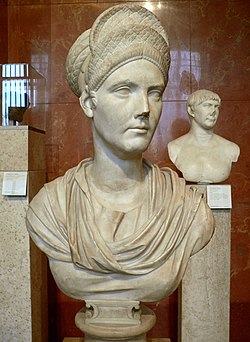| Roman imperial dynasties | ||||||||||||||
|---|---|---|---|---|---|---|---|---|---|---|---|---|---|---|
 | ||||||||||||||
| Nerva–Antonine dynasty (AD 96–192) | ||||||||||||||
| Chronology | ||||||||||||||
|
||||||||||||||
| Family | ||||||||||||||
| Succession | ||||||||||||||
|
||||||||||||||
Salonia Matidia[1][2] (4 July 68 – 23 December 119)[3] was the daughter and only child of Ulpia Marciana and wealthy praetor Gaius Salonius Matidius Patruinus. Her maternal uncle was the Roman emperor Trajan. Trajan had no children and treated her like his daughter. Her father died in 78 and Matidia went with her mother to live with Trajan and his wife, Pompeia Plotina.
Life
[edit]Between 81 and 82, Matidia married a suffect consul and former proconsul Lucius Vibius Sabinus. Sabinus died in 83 or 84. Matidia bore Sabinus a daughter called Vibia Sabina, who would marry the future Roman Emperor Hadrian. Matidia was very fond of her second cousin Hadrian and allowed him to marry Vibia Sabina.
In 84, Matidia married for a second time to an otherwise unknown Roman aristocrat called Lucius Mindius. Matidia bore Mindius a daughter called Mindia Matidia, commonly known as Matidia Minor. Mindius died in 85.

Matidia later married Lucius Scribonius Libo Rupilius Frugi Bonus, who was suffect consul in 88. Frugi had a daughter called Rupilia Faustina from an earlier marriage.[4][5][6] Faustina would go on to marry the Roman Senator Marcus Annius Verus, their daughter became empress Faustina the Elder and their son Marcus Annius Verus's son became emperor Marcus Aurelius.
Matidia often traveled with her uncle and assisted him with decision-making. Like her mother, Matidia was honored with monuments and inscriptions in her name throughout the Roman Empire. On 29 August 112, she received the title of Augusta upon the death and divinization of Marciana.[7]

When Trajan died in 117, Matidia and Plotina brought the emperor's ashes back to Rome.[8] In 119 Matidia died, whereupon the Roman Emperor Hadrian delivered her funeral oration, deified her, and granted her a temple and altar in Rome itself.[9] She thus became the first divinized Roman woman to be dedicated a full-scale temple of her own, as opposed to one shared with her husband or a smaller shrine.[10]
Nerva–Antonine family tree
[edit]
| |
| Notes:
Except where otherwise noted, the notes below indicate that an individual's parentage is as shown in the above family tree.
| |
References:
|
References
[edit]- ^ AE 1954, 0062
- ^ Levick, Barbara (2014). Faustina I and II: Imperial Women of the Golden Age. Oxford University Press. p. 161. ISBN 978-0-19-537941-9.
- ^ CIL VI, 02080
- ^ Rupilius. Strachan stemma.
- ^ Settipani, Christian (2000). Continuité gentilice et continuité familiale dans les familles sénatoriales romaines à l'époque impériale: mythe et réalité. Prosopographica et genealogica (in Italian). Vol. 2 (illustrated ed.). Unit for Prosopographical Research, Linacre College, University of Oxford. p. 278. ISBN 9781900934022.
- ^ "Libo Frugi's wife is unknown, but J. Carcopino, REA 51 (1949) 262 ff. argued that she was Matidia. This was supported by H. G. Pflaum, HAC 1963 (1964) 106 f. However, Schumacher, Priesterkollegien 195 points out that Libo Frugi's daughter Rupilia Faustina can hardly have been old enough, in that case, to be the mother of Marcus' father. The only way out would be to suppose that Matidia married Libo before her other two husbands; and was divorced from him (as he was still alive in 101). The theory becomes increasingly implausible." Anthony Richard Birley, Marcus Aurelius, p. 244
- ^ CIL XIV, 00244
- ^ William Smith. "Matidia". A dictionary of Greek and Roman biography and mythology. London. John Murray.
- ^ Samuel Ball Platner (as completed and revised by Thomas Ashby). A Topographical Dictionary of Ancient Rome, London: Oxford University Press, 1929. "Ara Matidiae" & "Templum Matidiae". Retrieved from LacusCurtius on 20 December 2008.
- ^ Levick, Barbara (2014). Faustina I and II: Imperial Women of the Golden Age. Oxford University Press. p. 122. ISBN 978-0-19-537941-9.